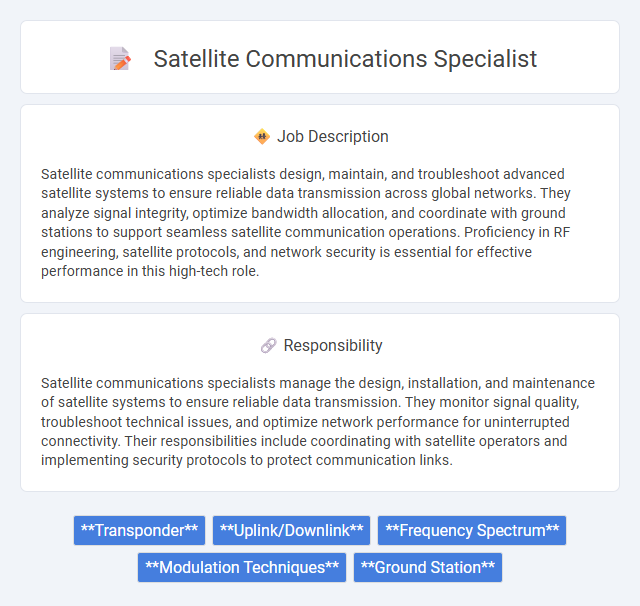
Satellite communications specialists design, maintain, and troubleshoot advanced satellite systems to ensure reliable data transmission across global networks. They analyze signal integrity, optimize bandwidth allocation, and coordinate with ground stations to support seamless satellite communication operations. Proficiency in RF engineering, satellite protocols, and network security is essential for effective performance in this high-tech role.
Individuals with strong analytical skills and a keen interest in technology might be well-suited for a satellite communications specialist role. Those comfortable working in high-pressure environments and adapting to rapidly evolving systems could have a higher probability of success. People who prefer routine tasks or limited interaction with complex systems may find this job less compatible with their preferences and abilities.
Qualification
A Satellite Communications Specialist requires a strong background in telecommunications or aerospace engineering, along with expertise in satellite systems, RF technology, and network protocols. Proficiency in troubleshooting satellite links, configuring ground station equipment, and familiarity with GPS, VSAT, and microwave communication systems are essential. Certifications such as CISCO CCNA, CompTIA Network+, or specialized satellite communications training enhance job prospects and demonstrate technical competence.
Responsibility
Satellite communications specialists manage the design, installation, and maintenance of satellite systems to ensure reliable data transmission. They monitor signal quality, troubleshoot technical issues, and optimize network performance for uninterrupted connectivity. Their responsibilities include coordinating with satellite operators and implementing security protocols to protect communication links.
Benefit
Satellite communications specialists likely enjoy high demand due to growing reliance on satellite technology for global data transmission and connectivity. Their expertise probably leads to competitive salaries and opportunities for career advancement in industries like aerospace and telecommunications. Working in this field may also offer exposure to cutting-edge technology and the chance to solve complex communication challenges.
Challenge
Satellite communications specialists likely face the challenge of maintaining reliable signal transmission in the presence of atmospheric interference and satellite positioning constraints. They may also encounter difficulties in troubleshooting complex hardware and software systems that require precise calibration and real-time monitoring. Adapting to rapidly evolving technologies and coordinating with global networks could further complicate their roles.
Career Advancement
Satellite communications specialists develop and maintain sophisticated satellite systems critical for global data transmission and connectivity. Mastery of signal processing, RF technology, and satellite network protocols accelerates career growth and opens pathways to advanced roles like satellite systems engineer or network architect. Continuous certification in emerging technologies and hands-on experience with next-gen satellite platforms enhance potential for leadership positions in aerospace or telecommunications sectors.
Key Terms
Transponder
A Satellite Communications Specialist manages the operation and optimization of transponders, critical components that receive, amplify, and retransmit signals between satellites and ground stations. Expertise in transponder bandwidth allocation, frequency management, and signal modulation ensures uninterrupted and high-quality satellite communication services. Proficiency in troubleshooting transponder anomalies and configuring onboard payloads enhances communication reliability and efficiency across global networks.
Uplink/Downlink
Satellite communications specialists manage uplink and downlink operations to ensure seamless transmission of data between ground stations and satellites. Expertise in frequency management, signal modulation, and error correction is essential for optimizing signal strength and minimizing interference during these processes. Proficiency with RF systems, antenna alignment, and network monitoring tools enables specialists to maintain reliable, high-quality communication links.
Frequency Spectrum
A Satellite Communications Specialist expertly manages the frequency spectrum to optimize signal clarity and bandwidth allocation for satellite transmissions. They ensure compliance with international spectrum regulations while minimizing interference between satellite signals and terrestrial networks. Mastery in spectrum analysis tools and knowledge of frequency coordination protocols is essential for maintaining reliable and efficient satellite communication links.
Modulation Techniques
Satellite communications specialists design and implement advanced modulation techniques such as QPSK, 8PSK, and QAM to optimize bandwidth efficiency and signal integrity in satellite links. Expertise in modulation methods enables the minimization of signal distortion and interference, improving data throughput and link reliability in varying atmospheric conditions. Proficiency in adaptive modulation schemes also supports dynamic adjustment to channel conditions, maximizing overall system performance in satellite communication networks.
Ground Station
A Satellite Communications Specialist in the Ground Station domain manages and maintains critical infrastructure such as antennas, transceivers, and signal processing equipment that enable uplink and downlink transmissions. Expertise in RF signal modulation, demodulation, and error correction protocols ensures optimal data integrity and system reliability. Proficiency in satellite network operations and troubleshooting satellite telemetry, tracking, and command (TT&C) systems is essential for seamless communication with orbiting satellites.
 kuljobs.com
kuljobs.com